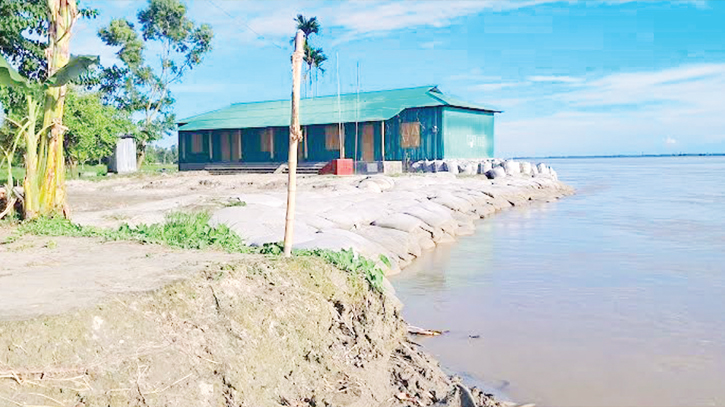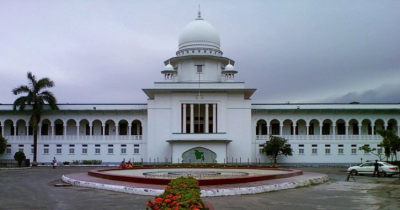
The Char Khitab Kha Government Primary School in the Gariyaldanga Union of Rajarhat Upazila of Kurigram is at risk due to the erosion of the Teesta River. Photo: Messenger
Over the past 15 days, the residents living along the banks of the Teesta River in Kurigram have faced relentless erosion, forcing many to abandon their homes. So far, nine houses have been completely washed away by the river, while 50 to 60 more homes, including a government primary school, are at risk.
Nazma Begum, a resident of Char Khitabkhah village in Ghorialdanga Union under Rajarhat Upazila, shared her sorrowful plight. She said, "We’ve lost our house, our family’s ancestral land. Where will we go now? Please, help us find shelter." Her husband, Somir Uddin, added in distress, “This is the third time our house has been destroyed by erosion. Now, we have nowhere to stay. Please save us!”
The local Union Chairman, Abdul Kuddus Pramanik, expressed his frustration, saying, "Does it really take a journalist’s visit to report on the destruction of six or seven houses? I have no comment to offer. This kind of erosion happens all the time. What will writing about it change? Please, leave me alone. I have nothing to say."
For the past 15 days, the erosion has been particularly severe, stretching from the Sarishabari Shallow Ghat to the east, up to Char Khitabkhah Government Primary School. Despite attempts to place geo-bags on either side of the school to prevent further erosion, the aggressive Teesta River continues to carve into the land in a crescent shape, swallowing everything in its path.
Former Union Member, Shahidul Alam, commented, “In just the last 15 days, nine houses have been destroyed in this area. Besides the primary school, another 50 to 60 homes are at risk of collapsing into the river. In the past seven days, the houses of Fakir Uddin, Sona Mia, Monnaf, Chand Mia, Motiar, Atiar, Anam, Azizul, and Babul have been wiped out. Despite repeated pleas to the Water Development Board for help, our requests have gone unheard.”
Upon visiting the area, the true scope of the devastation becomes clear. The river, calm one moment and ferocious the next, is erasing farmlands and homes at an alarming rate. The eyes of the farmers, filled with despair, reflect the deep sorrow of losing both their homes and their crops. With no measures being taken to prevent the erosion, the residents stand helplessly, staring at the ongoing destruction.
Farmer Hamid Ali, one of those affected, lamented, "I’ve lost one acre of farmland to the river. I have no land left to cultivate now. With my children, we’re on the brink of homelessness."
Similarly, Jaheda Begum shared her anguish, “The river has almost reached our last remaining piece of land. Even after pleading with others for help, I’ve found no place to stay. Tell me, where should we go?”
When asked about the actions being taken to help those affected by the erosion, Chairman Abdul Kuddus Pramanik angrily repeated, “Why do you need journalists to report on the destruction of six or seven houses? You people do nothing. You just come to annoy us. I won’t comment further. This kind of erosion happens often.”
In response to these pressing concerns, Rakibul Hasan, Executive Engineer of the Kurigram Water Development Board, stated, “Due to budget constraints, we are unable to offer immediate assistance. However, we have already placed 300 geo-bags to protect the school. We’ve requested more bags, but for now, we’re receiving only a limited supply. As much as we would like to, we cannot reach all the affected areas at this time.”
The residents of the Teesta riverside continue to face uncertainty and fear as the river threatens to swallow their homes and livelihoods. While some assistance is being provided, the need for more effective intervention is critical to prevent further devastation.
Messenger/Fameema








